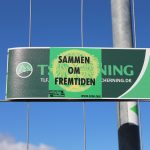By Beata Wallsten and Sandra Kaarsgaard, Monday March 22nd 2021
Mussels and seaweed is one way to go for a cleaner Copenhagen harbour. On Kalvebod Bølge, or Kalvebod Wave, on the Danish capital’s waterfront, the organization Havhøst is cultivating life under water.

Photo: Sandra Kaarsgaard
The mussels eat the nutrition and the algae in the water and become mussels which we could eat. That is why it is regenerative.
Kathrine Strange, student worker from Havhøst.

Unlike mussels, the seaweed does not clean the water, but it uses nutrition to grow and then becomes an edible leaf.
By removing nutrients from the water like this, growing seaweed helps the ocean, she continues.
We have too much algae and nutrition in the water which makes it unhealthy. The nutrition is coming from farming.
says Kathrine Strange
The water in the Copenhagen harbor is at the moment clean enough for swimming, but not necessarily for eating the mussels. Kathrine Strange thinks this could be possible in the future.
She adds that more initiatives like this are needed for a cleaner harbour. As well as for strengthening the Danes’ relationship to the water which they are surrounded by.
We can eat and harvest the ocean in a sustainable way. Then we can get this better world and ocean and strengthen our love for it.
Kathrine Strange



